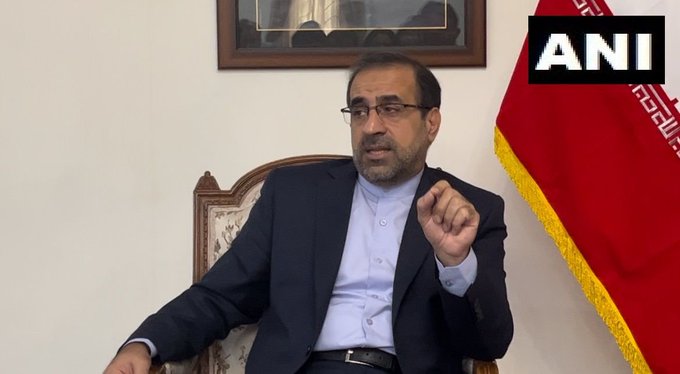AMBASSADOR ELAHI JUSTIFIES MILITARY ACTION AGAINST ISRAEL : Labels Israel as terrorist regime, vows strong response to future provocations
AMBASSADOR ELAHI JUSTIFIES MILITARY ACTION AGAINST ISRAEL : Labels Israel as terrorist regime, vows strong response to future provocations

Iraj Elahi, Ambassador of Iran to India, made a significant statement during a press conference at the Iran Embassy in New Delhi, defending Iran’s recent attack on Israel. Elahi asserted that Iran’s actions were a legal and legitimate response, grounded in the fundamental right of self-defense. The attack targeted Israeli military infrastructure on April 14 night, following an assault on Iran’s consulate in Damascus on April 2.
Confirming the loss of seven Iranian officials, including senior commander Mohammed Reza Zahedi and Mohammad Hadi Haji Rahimi, the Islamic Revolutionary Guard Corps mourned the tragic incident. Elahi described Israel as a terrorist regime, emphasizing that any repetition of such actions would provoke a decisive response from Iran.
The ambassador’s defense of Iran’s actions sheds light on the escalating tensions between Iran and Israel, rooted in longstanding regional conflicts and geopolitical rivalries. Iran’s perception of Israel as a hostile entity has fueled a series of confrontations, with both sides engaging in tit-for-tat retaliations.
Iran’s justification for its attack on Israel revolves around the principle of self-defense, a cornerstone of international law. The Iranian government maintains that it has the right to protect its interests and sovereignty against external threats, including perceived aggression from Israel.
However, Israel views Iran’s actions as provocative and destabilizing. The Iranian-backed militias operating in Syria and other parts of the Middle East have been a source of concern for Israel, which sees them as proxies for Iranian expansionism and a direct threat to its security.
The recent escalation in hostilities between Iran and Israel underscores the complex dynamics of the Middle East, where competing interests, sectarian tensions, and geopolitical rivalries intersect. The Syrian conflict, in particular, has become a battleground for regional powers vying for influence, further exacerbating tensions in the region.
In the broader context of international relations, Iran’s defense of its actions reflects its efforts to assert its regional influence and project power beyond its borders. Despite facing economic sanctions and diplomatic isolation, Iran remains a key player in the Middle East, wielding significant influence through its support for proxy militias and alliances with countries like Syria and Lebanon.
The Iranian ambassador’s warning to Israel of a “decisive response” underscores the potential for further escalation in the already volatile region. With both Iran and Israel unwilling to back down, the prospect of a wider conflict looms large, posing a grave threat to regional stability and international security.
Iraj Elahi’s defense of Iran’s attack on Israel highlights the deep-seated animosity between the two countries and the escalating tensions in the Middle East. As the specter of conflict looms large, diplomatic efforts to de-escalate tensions and find a peaceful resolution to the underlying grievances are more critical than ever.
